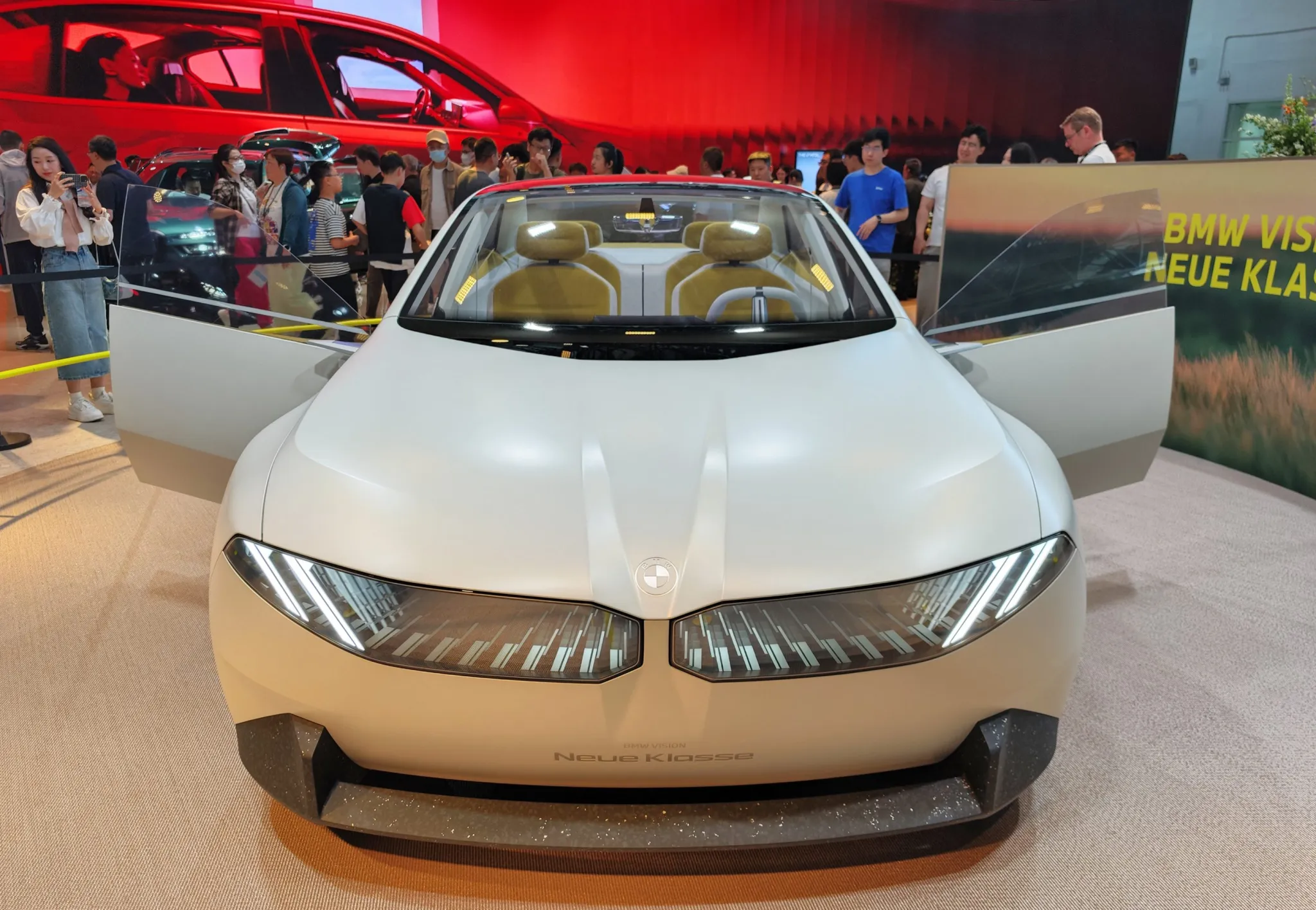Forget China, Mexico’s Trump card is BMW’s secret weapon for electric cars
Take the i3, audacious in design and popular over the 11 years of its manufacture, selling a quarter of a million units. Now, BMW is hoping to become a leader in electrification again with its Neue Klasse generation. However, it won’t be making these new EVs in the U.S. They will be manufactured in Mexico. With the risks of trade wars on the horizon, this could be a smart move.
Despite the head start, BMW failed to take advantage of its early lead when the second wave of EVs like the Tesla Model 3 and Y went global in 2019/20. The company has returned to form since then with an extensive electric range, which enabled it to surpass Tesla in sales in Europe in July.
However, most of these current EVs are built on platforms shared with internal combustion engine models, as BMW hedged its bets while electric market growth remained unpredictable. The upcoming Neue Klasse is different. It’s designed for Battery Electric Vehicles (BEVs) first.
Neue Klasse Déjà Vu All Over Again?
The new Neue Klasse harks back to BMW’s company-saving strategy of the 1960s, also of the same name. Back then, BMW was producing some brilliant cars, such as the tiny Isetta and beautiful 502 convertible, but was failing to sell them in enough volume resulting in financial difficulty. So with the 1962 Neue Klasse, BMW dropped all the old models and moved to a shared platform across the range, resulting in much-loved vehicles such as the 1800 and 2002. This laid the foundation for the models that are now globally familiar, such as the 3-series.
BMW isn’t facing the same financial issues as the early 1960s, although it has seen its profits plunge by 84 percent due to a slump in sales in China. But electrification is a huge challenge to the entire automotive industry, with many incumbent manufacturers being left behind. Globally, Tesla and BYD dominate BEV sales, shifting over a million cars each in the first three quarters of 2024. Geely and Volkswagen are a distant third and fourth respectively selling half a million apiece. All four focus primarily on BEV-native designs. While bet hedging has advantages during the transition, it misses out on the advantages a platform designed specifically for batteries can offer, such as greater internal space.
The new Neue Klasse signals that BMW has realized that the transition is past the point of no return and it’s time to go “all in” with BEVs. The company is clearly expecting this new generation of cars to be just as game-changing as its 1960s pivot. Although the poster child of the new Neue Klasse has been the sedan, an SUV (which BMW calls SAV, standing for sports activity vehicle) is going to be the initial release in 2025. The first factory to build Neue Klasse cars has been the plant in Debrecen, Hungary, with Munich becoming exclusively all-electric in 2027. This makes sense to serve the European market–but what about the critical US market?
Flexible Mexico
Enter Mexico. You would think BMW would be building its EVs in the U.S. for the U.S. market, and for most of its mainstream internal combustion models, it has, through its huge plant in Spartanburg, South Carolina, which produces 1,500 cars a day. However, BMW has proven the potential for Mexico as a global center for car production, with the successful 2-series and its hot M2 derivative made exclusively in Mexico for the entire global market. In America, the 2-series has won a series of coveted quality awards from J.D. Power, showing the quality that the Mexican operation is capable of.
Currently, BMW’s factory in San Luis Potosí, Mexico, is the company’s newest facility, and the construction work is well underway to add an 80,000m2 battery pack production unit to serve the Neue Klasse EVs, which will begin production in 2027.
According to Oliver Haase, Senior Vice President for Purchasing, Quality and Supplier Network, BMW Group Americas, Mexico is a “natural fit for manufacturing the next generation of BMW EVs for the Americas market.” He also sees its potential beyond the North and South American continents. “BMW will be the first premium automaker to produce EVs and batteries in Mexico.”
This is about much more than cheap labor costs. “Mexico has 14 free trade agreements with 50 countries,” says Francisco N. González Díaz, Executive President, Industria Nacional de Autopartes, A.C.. Most important among these is the USMCA with the USA and Canada (formerly NAFTA), but Mexico also has an agreement with the European Free Trade Association, including the EU, Iceland, Norway, Lichtenstein and Switzerland. There are agreements with most of South and Central America, plus the U.K. and the CPTPP, which includes Australia, Japan, New Zealand and Singapore. “This makes it an incredibly good place to build cars for a global market.”
Mexico is a “natural fit for manufacturing the next generation of BMW EVs for the Americas market.”
Oliver Haase, Senior Vice President for Purchasing, Quality and Supplier Network, BMW Group Americas
Putting that in perspective, Mexico exports a greater value of cars to Germany than China or the U.K. – nearly $4.8 billion in 2023 (this includes other brands than just BMW). The country has a thriving car part supply chain and ready availability of STEM graduates for employment in the auto industry. BMW puts a lot of effort into providing training and apprenticeship opportunities with local universities and has even turned its original greenfield office building at San Luis Potosí into a youth activity center for the local area called the Club de Niños y Niñas.
The Neue Klasse has been pitched as an all-electric generation. However, Haase admits this doesn’t mean the end of internal combustion at BMW. “The Neue Klasse will lead the design direction,” he says, “but there will be room for vehicles with other types of powertrains within the new generation.” In a similar fashion, Stellantis’s recent BEV-focused platforms, such as that used in the Peugeot e-3008, also support hybrid internal combustion motors.
Mexico’s Trump Card?
Donald Trump’s reelection could be a spanner in the works for BMW’s Mexico strategy. During his campaign, on the Joe Rogan podcast he proclaimed his undying love for tariffs and threatened a 60% tax on imports. EVs made in China already face 100% tax when imported into the USA. Even with China’s considerably lower production costs, that has left Chinese automakers looking for local production or putting all thoughts of entering the American market on hold.
Mexico’s auto industry exported over $64 billion in the first half of 2024. That’s a significant contribution towards the country’s income, with a GDP of $1.789 trillion in 2023. Mexico imported just over $41 billion in auto products, giving a positive trade balance of nearly $23 billion, with the U.S. being the biggest contributor and growing. That’s the kind of deficit the President-Elect would like to reverse back in the U.S.’s favor. Trump has not mentioned canceling the USMCA yet. There was a joint review already scheduled for 2026, but this only starts a ten-year clock for the expiration of the USMCA, and Trump is more focused on restricting Chinese companies than German ones operating production in Mexico. Still, he could also try to restrict imports from elsewhere, including Mexico.
BMW already has its huge U.S. production plant in Spartanburg, North Carolina, so in theory, it could switch some production there – although it won’t be easy considering how much work (and money) has gone into preparing the factory in Mexico to make EVs. A spokesperson for BMW told Fortune: “Nothing will be forthcoming at this stage. It’s too early for us and we don’t wish to speculate.” That seems to be the mood of the moment, with other companies making similar statements. Nobody knows exactly what President-Elect Trump plans to do (probably including himself). However, while he could renegotiate the USMCA, that won’t directly affect Mexico’s other trade deals.
He could trigger a tit-for-tat international trade war, with non-U.S. trade agreements caught in the crossfire. But even Trump is unlikely to be able to demolish the complicated lattice of global deals in his four years as US president. Despite recent political events, BMW’s plan to make the Neue Klasse in Mexico still seems smart. Not only does it enable delivery of BMW’s new electric generation to the key U.S. and Americas market. It can deliver this vital new range to many other countries with minimum trade barriers.



